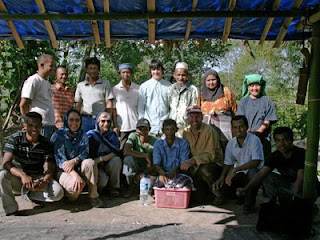 I've been working on a project investigating organic fair trade coffee, tracing the bean from the growers through the various intermediary steps terminating with the consumer. Its been a long and complex route with new facts learned at every step. With each bean of knowledge I gain the complexity grows.
I've been working on a project investigating organic fair trade coffee, tracing the bean from the growers through the various intermediary steps terminating with the consumer. Its been a long and complex route with new facts learned at every step. With each bean of knowledge I gain the complexity grows.The question that kept arising was "What is Fair Trade and what does it really signify?"
Today I spent the afternoon talking with Mark of Conscious Coffee who helped answer these questions. A local roaster with over 12 years in the industry, Mark is on his way to Aceh, Sumatra to visit some of the same coffee growers we met this past summer. We thought it might be good to share our experience and get his take on the confusion behind the fair trade label.
 So why are there so many fair trade labels and products out there and what is the difference?
So why are there so many fair trade labels and products out there and what is the difference?Fair Trade is a certification that provides rules regarding pesticide use, workers treatment..etc that growers must meet in order to get the Fair Trade label. Much of the coffee Mark at Conscious Coffee buys comes from cooperatives who have invested their time and energy into creating a high quality coffee bean for the specialty coffee market that includes conforming to the regulations for fair trade and organic certifications.
They are the Fair Traders.

Conscious coffee and other roasters like it make a conscious decision to invest in these communities not because they have the best tasting bean or because they offer the best priced fair trade organic coffee. They invest in these communities because these cooperatives are making a long term commitment to produce high quality coffee that will help to support their community and improve their lifestyle. This intention is important to both sides of the conscious coffee market. Fair traders want to help facilitate this process. Its not "Profit Over People" coined by Noam Chomsky, but profit working for people.
 On the consumer side of this relationship the connection from the cup of coffee they buy to the grower becomes transparent. They can trace that cup of coffee directly from the region of the world where the coffee was grown, to the cooperative, and often down to the farmer and village who grew the beans.
On the consumer side of this relationship the connection from the cup of coffee they buy to the grower becomes transparent. They can trace that cup of coffee directly from the region of the world where the coffee was grown, to the cooperative, and often down to the farmer and village who grew the beans.The gist of this is that by consciously choosing to buy traceable beans you invest not just in yourself and your immediate pleasure, but in the future of these people and communities laboring to provide these products for your consumption. (Yes, this is a simplistic way to look at it because the issues surrounding coffee growers is so complex and transcends political as well as socioeconomic concerns, but this is also an important way to understand these relationships between our consumption and their production).

A Fair Trader is a person or business who's idea of success is wrapped up in the success and sustainability of those communities that produce the products they sell.
Other retailers offer Fair Trade coffee but they are simply outlets for marketing this product without a connection to the source. The money they make never makes it back to the origin or growers because there is no partnership involved. These large retailers don't know their growers, the regions or the concerns of the coffee growers. The growers have no voice.
 Fair Traders like Conscious Coffee considers the producers and communities as integral parts of their business and are invested in improving not only their lives but the lives of the farmers as well.
Fair Traders like Conscious Coffee considers the producers and communities as integral parts of their business and are invested in improving not only their lives but the lives of the farmers as well.
















